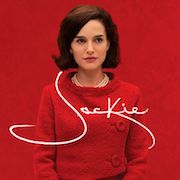“There will never be another Camelot,” declares Jackie Kennedy with unbearable pomp towards the end of Pablo Larraín’s recent film. She’s referring to – and already mythologising – her late husband’s presidential team. Hard to dispute her claim on the basis of today’s cabinet of horrors, but it’s a particularly cloying moment in a film whose score by Mica Levi – ambivalent and rich in reference points – turns out to be its saving grace.
We hear before we see in Jackie: a downward-swooping major chord whose smeared trajectory recalls Levi’s main theme for 2014’s Under The Skin. It’s a technique that’s rapidly become her trademark, symbolic of cinema’s revived penchant for mid-century Polish sonorists like Krysztof Penderecki. But there’s far more going on here – as in Under The Skin – than the mining of 1950s modernism. Levi’s music has a brazenly homemade quality, from the earlier Micachu & The Shapes records to last year’s collaboration with Oliver Coates. Often her use of silence and fragmentation is almost dub-like, but here it re-orients emotional expectations superbly as Jackie struggles with the shock of her husband’s assassination. In ‘Empty White House’, stately classical motifs die away with a compelling abruptness. The performances, seemingly close-miked to capture every bow-scrape and key-click, only sharpen the vivid sense of human imperfection.
This was never going to be a repeat of Under The Skin’s trippy chemical rush. Even if the two films share complex, isolated female characters as their focus, the settings could hardly be more different: where Under The Skin imagined contemporary Glasgow as stalked by the supernatural, Jackie’s is the suffocating world of the White House, its corridors of power and spaces of prestige. It’s also the world of affluent white America in the Kennedy years, and Levi’s soundtrack is surely haunted by the conservative musics of the time: the tune heard in ‘Vanity’ unfurls like a fossilized cool-era jazz solo, brittle and forlorn, while the palette throughout has shades of the square, saccharine Brill Building sound that dominated the early 1960s – jaunty flutes, airy strings, flecks of tambourine – before the rowdy arrival of the Beatles and the glory years of Motown.
Jackie deals with a political culture fixated on image management, and much of the music registers this play of surfaces. ‘Children’, in particular, is a strange carousel of appearances: notes hang and recede with an almost MIDI-like coldness, somehow accumulating all the old-school suspense of a Bernard Herrmann Hitchcock score. The deeper resonance, meanwhile, is with the asymmetric constructions of Morton Feldman – patterns that circulate but never quite repeat.
Ultimately, Levi’s music only just cuts through the problems of the film. Yes Larraín is right to ask that we empathise with Jackie’s loss on a personal level, but he demands this as part of a wider package: that we mourn the loss of a ‘great man’, the leading light of a group of ‘ordinary men banding together to fight for a better world’. The film never really challenges the absurd myth-making that Jackie helped initiate, and that soon made JFK an infallible totem for American righteousness. The last part of the score, sweeping over the final scenes with uncharacteristic grandeur, seems to yield to the spin.
Still, there’s no doubt that the soundtrack deserves an Oscar later this month. It’s been widely noted that Levi is the first woman in twenty years to be nominated for Best Score, but that she should win has nothing to do with gender, and everything to do with the off-modern freshness of her approach in a field dogged by generic bombast and minimalism-by-numbers.


